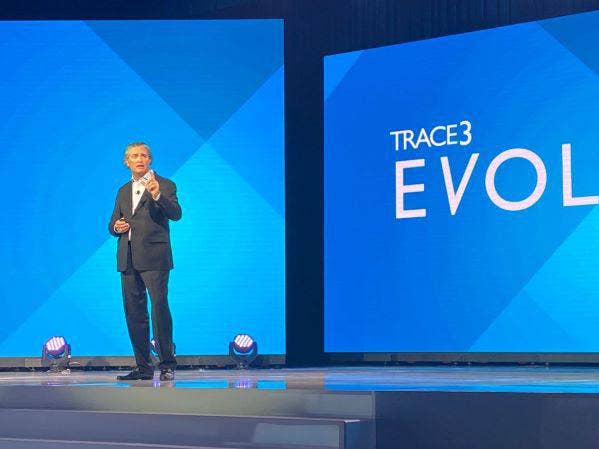Trace3 CEO: In 2042 We’ll Be More Services-Led Than Technology-Led
‘I think we’ll probably be more of a services company than a technology company. We’re 75/25 today, product 75 percent, tech services 25 percent. My guess is those numbers will probably flip by then,’ Trace3 CEO Rich Fennessy tells CRN.
Rich Fennessy, Trace3 CEO, said the company has seen its portfolio of solutions and services grow exponentially as the needs of customers have grown.
“All this growth has been fueled by our belief that all possibilities really do live in technology,” he said.
In fact, he believes in 20 years Trace3 will be more services-led than technology-led.
“Throughout our evolution as a company, Trace3 has always strived to go carve out a unique position in the marketplace,” he said. “We want our clients to call on us to bridge these two worlds. We want to assist in strategy development and, just as importantly, we want to connect strategy to execution to technology and truly partner with them to go drive superior business outcomes.”
This year, Trace3 is celebrating its 20th anniversary. Over the past two decades, the Irvine, Calif.-based solution provider has seen a lot of change in the needs of enterprise and SMB customers. Its portfolio has grown to include professional services, assessment and advisory services, managed services management, consulting and overall project management services.
“We have extended our portfolio of clients and we’ve had to evolve with that,” said Fennessy. “Today, our portfolio of technology solutions are rich in key topics like cloud, cybersecurity, data intelligence and helping our clients modernize their hybrid IT environments.”
CRN spoke exclusively to Fennessy about where he sees the company in the next 20 years and how the industry is changing to a more services-led model.

Trace3 is celebrating its 20-year anniversary this year. Where would you like to see the company in 2042?
That’s a long way out in the future, my gosh. But if you look at the last 20 from zero [sollars] to $2 billion, I think we will probably be more like $10 [billion] to $20 billion by that time in terms of size and scale. Some people always ask me, ‘Why do you talk about how much you sell, and the reality is in our industry scale matters. So you need to have scale because with scale comes capabilities, comes reliability from our client relationships. Quite honestly, I think I’ll be retired by that time, 20 years from now. But with that said I think our industry is always consolidating. It’s always the bigger getting bigger. Companies like Trace3 … the kind of the innovation angle that we have I think is unique. So I think we’ll continue to get bigger in that same theme. I think our geography footprint, which we’re a U.S. company, I’ve taken several companies global so I think global would be in that time frame for sure.
I think we’ll probably be more of a services company than a technology company. We’re 75/25 today, product 75 percent, tech services 25 percent. My guess is those numbers will probably flip by then. Think of how people use technology in terms of cloud computing and that kind of stuff. I think some of those bigger trends would kind of come into it. So just that same kind of focus on always trying to bring new stuff to market and hopefully doing cool things for customers everywhere.
You mentioned consolidation. So what are your thoughts on the M&A going on?
I think it’s needed. It really is. I do think the problem we’re all trying to solve for. Customers are getting more complex so the reality is you’ve got to have a lot of engineers, you’ got to have a lot of good capabilities. It’s hard for $100 million company, a $200 million company, to kind of have what it really takes, so I think you need consolidation. I would love to go acquire two or three more cloud consulting companies just because the need is so high. Buying companies and bringing their capabilities in is a much faster way to go get to where we want to be.

How has the pandemic changed Trace3’s business model?
The business model really hasn’t changed fundamentally. We’re still kind of an innovation-led, emerging tech-inspired kind of company. We’re still four-to-one engineers to salespeople so we’re being very tactical with our customers. The biggest thing that’s changed is [actually] two things. One is our service business. It’s amazing how much we learned how much we can do remotely. I mean the old days of showing up at the office, go plugging something in or to go configure something … we’re doing all that remotely. That was pretty wild to go figure out you can really do that. And then two is what we’re selling is different. We were selling a lot more classic hardware. And today we’re selling a lot more software, a lot more services, a lot more cloud and a lot more security. So the topics have switched, which I think is kind of conducive to what’s going on in the world. Security is a big topic. I spent most of my career in security and it’s continued to be huge. Clouds becoming huge. So those topics kind of pop up. And the cool thing about Trace3 is we’re pretty agile, so we move where the opportunities are.
What are your customers’ biggest pain points and how is Trace3 addressing them?
The biggest pain point through the pandemic has been, ‘How do I continue to go have some normalcy in my business? How do I continue to go operate? How do I go deal with remote workers?’ That’s migrated over the last year to now, ‘How do I go deal with the fact that technology is still an enabler for my company to do cool things, but I can’t get the stuff because of the whole supply chain stuff?’ I think we’re going to go into a different cycle over the next two years with the uncertain economy. So, ‘How do I go make a decision about my customer? There’s 10 projects I want to go do but I can only afford to do two or three.’ So we’re putting a lot of focus on how do we go help our clients identify ways to go reduce cost inside their infrastructure so they can fund more cool projects that they want to do. That’s really going to go give them more differentiation in the marketplace. So we literally have just trained all of our sellers on six plays, like how do we go cut costs for our customers.

How are you recession-proofing Trace3 and helping your customers recession-proof themselves?
So externally we have a whole focus on, we call it, our cost optimization strategy. So we rolled out like six different plays that all of our sellers just got trained on over the last four months. That’s everything from leveraging managed services because we can perhaps do it cheaper because we have more scale. So instead of doing things in-house you can rely on us. It’s how do we go help you get to the cloud faster, but also when you get there know what your costs are. How to optimize your cost? Those are just two of them. The whole concept is when your customer comes in, knocks on the door and says, ‘Hey, bad news. I just found out our budget got cut by $5 million.’ How do you turn that into an opportunity and say, ‘How can I help you find that $5 million and are any of these six ideas relevant?’ Hopefully that way we can maybe help them go cut $10 million out of their plan so you can go redirect [$5 millon] of it. So we’re all over it. It’s happening and the customers are going to be concerned about it. It’s going to be different by industry so we’re trying to enable our sellers and our engineers to get out there and say, ‘Hey, don‘t walk away from that conversation. Figure out how you go help your customer.’
When it comes to talent and supply chain shortages, how is Trace3 handling that?
We’re 1,200 people strong and we are growing. I think we have 100 open tickets right now, so we’re aggressively out there adding people, typically engineers and people within our services business. We have an in-house recruiting team that we’ve invested in over the years. So we’re out there. That’s one positive thing of COVID. Before, you had to go find people in a certain city, now the whole U.S. is open to us. So we‘re out there.
What do you want more of from your vendor partners?
We’re all talking the same stuff and it’s how do we go take these new ideas and new solutions, whether it’s cloud, computing solutions, visibility, automation … how do we bring them to market and put them in terms that customers really say, ‘Gosh, that’s going to give my business value. I can actually see a better business outcome because I just bought this from you.’ They’re all trying to go figure out how to go, quite honestly, differentiate themselves. And I think they see Trace3 as somebody who, because of our technical team, can help them really articulate what that solution is because some of the stuff is pretty complex. We do have a rich set of customers. We’ve done business for two decades. And so to me, the partner community is very aligned to us and very excited about what we’re doing. And we’re excited about what they’re doing. There’s a lot of cool innovation that’s coming out right now, that’s what feeds this industry—just new ideas.

During your keynote at Trace3 Evolve you said that a client described Trace3 as ‘Accenture without all the hassle.’ So what makes you better than Accenture?
The point I’m making by that comment is we want to be viewed, it’s a term that’s overused in our industry, as the trusted adviser. But we want to be involved in the whole cycle of strategy, creation, to then how do I connect that strategy to an implementation plan or an execution plan, to then eventually what is the technology. Too many times the value-added reseller comes in at the end. What we try to go do is connect strategy, execution and technology. So when I said that, that’s the kind of relationship we want to have. We want [our clients] to think of us as a consulting company because we have a lot of consultants. We want them to think of us as an engineering company, because we have a lot of engineers and we’re also great in terms of deployment. The professional services business, we do that too. So that comment was an evolution of our value prop in terms of beginning to end.
Where are you placing your bets in terms of industry trends in 2023?
I think the biggest thing we‘re going to go see is this whole topic of convergence. If you look at the channel, most of the channel has been built over the years in vertical segments. You have an infrastructure business, you have a security business, data business, you have an end user computing business, that’s how we all got built. But the reality is, I see that going the other way and all these topics are converging together. You really cannot have a cloud strategy if you‘re not thinking about security. You can’t have a data strategy if you‘re not thinking about cloud. I think what we’re going to see is all these topics, which were individual strategies, individual initiatives are all going to be one big strategy inside of a typical enterprise. It’s one set of initiatives and it‘s complex. Think about security, think about cloud, think about data all in one thought and how it all connects together. That takes some pretty smart people. Fortunately, that’s what we‘ve been hiring and that’s that kind of people we have inside of Trace3.